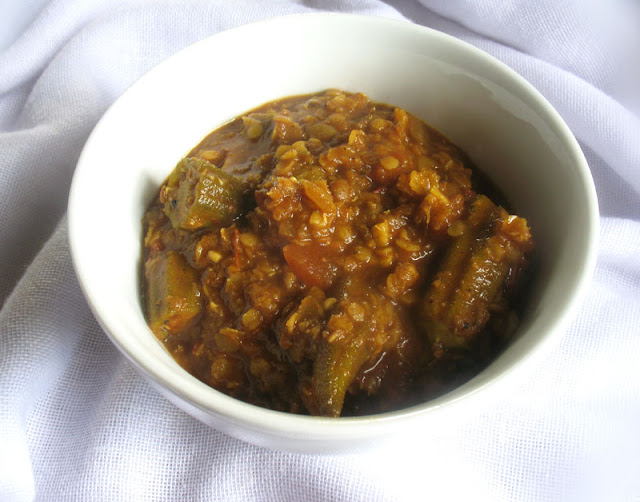I haven't been posting much because I have been making recipes that have already been documented in this space. That said, I do have a recipe to present that has been sitting in my draft folder for quite a while. That's a shame, because it is a good one and not difficult to prepare either.
I'm especially fascinated with different cuisines and African food certainly stimulates the palate. This Ethiopian-style stew is spicy and tart yet mellowed out with the addition of silky okra, a vegetable I don't use as often as I should. High in nutrients and antioxidants, the taste is rather difficult to describe, but it does nicely fill out soups and stews and is often enjoyed breaded and fried.
Homemade berbere is a must here. It's of blend of chilies and aromatic spices that takes very little time at all to make up and it keeps well in a sealed glass jar for a good few months.
Green beans can been used in place of the okra is you please.
I served this dish with spiced teff cakes with sun-dried tomatoes but as with all Ethiopian vegetable dishes it would go also go well with injera bread, a spongey sourdough bread made with teff flour.
 Ethiopian-Style Red Lentil and Okra in a Spicy Tomato Sauce Ethiopian-Style Red Lentil and Okra in a Spicy Tomato Sauce |
| Recipe by Lisa Turner Adapted from Teff Love: Adventures in Vegan Ethiopian Cooking Cuisine: Ethiopian Published on April 22, 2016 Red lentils and okra simmered in a simple, spicy and aromatic Ethiopian-style tomato sauce Preparation: 10 minutes Cooking time: 45 to 50 minutes  Print this recipe Print this recipeIngredients:
|
Other African recipes to try from Lisa's Vegetarian Kitchen:
Chickpea Patties Smothered in Vegetable Gravy
Mixed Vegetables in a Basic Ethiopian Kulet Sauce
Ethiopian-Style Hummus
Vegetarian Harira (Moroccan Chickpea and Lentil Stew)




1 comment:
This looks great - I'm a big fan of okra but don't think to cook with it often. We used to have an Ethiopian restaurant in Sheffield and I loved the injera bread there. I'll have to investigate whether I can buy it somewhere. Thanks for the Ethiopian inspiration!
Post a Comment